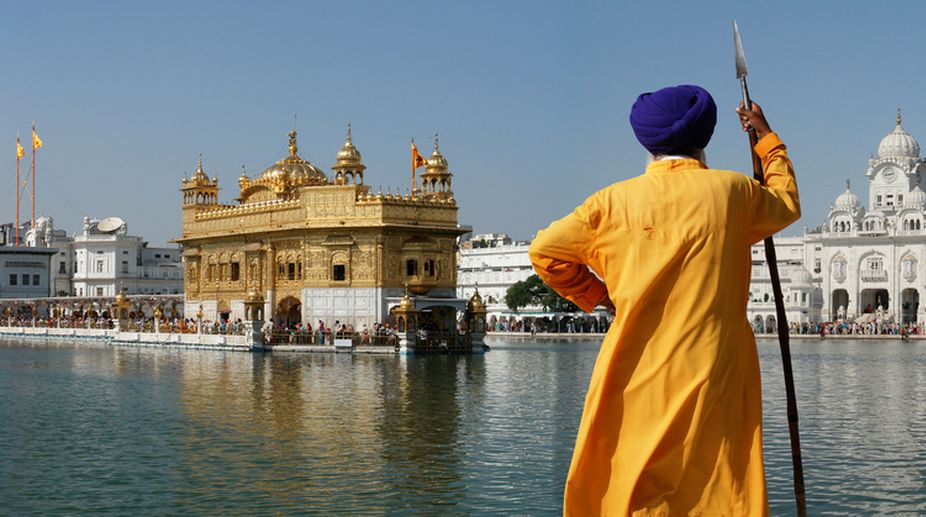India asks Pakistan to take strict action to stop cross-border terrorism
India on Friday strongly criticized Pakistan for supporting terrorism, saying that the whole world knows who is the progenitor of cross-border terrorism.

Representational image (Photo: Getty Images)
Even amidst strained ties between India and Pakistan certain linkages have remained intact. One such link is religious pilgrimages of the Sikh community. Groups of Sikh pilgrims – ‘Jathas’ – coordinated by Sikh bodies from India, visit Pakistan on four occasions, Gurpurabof Guru Nanak Devji ( birth anniversary of Guru Nanak Dev), Baisakhi, Shaheedi Purab of Guru Arjan Dev (martyrdom day of Guru Arjun Dev) and the death anniversary of Maharaja Ranjit Singh. The Shimla Agreement has a provision for the visits of Sikh Jathas on these four occasions. In 1974, both countries signed a visa agreement for providing each other’s citizens access to certain places of religious worship. Indian pilgrims are allowed to visit a total of 18 shrines.
Former Prime Minister Manmohan Singh during his speech at the inaugural service of the AmritsarNankana Sahib bus in March 2006 very rightly stated: “Ever since the Independence of our country in 1947, every morning, every devout Sikh prays to let us have free access to the Gurudwaras left behind in Pakistan….”
Advertisement
Amidst the endless bickering between two nation states, two books have sought to highlight the strong connection of the Sikh faith with Pakistan; Amardeep Singh’s ‘Lost Heritage: The Sikh Legacy in Pakistan’, and ‘Walking with Nanak’ by Haroon Khalid a Pakistani scholar.
Advertisement
Between 2005-2007, a number of initiatives were taken by both governments to strengthen people-to-people ties between both Punjabs (the Amritsar-Nankana Sahib bus service being one of them). Religious tourism (not just by Sikhs, but Hindus) was thought of as an important component of people-to-people linkages.
Apart from easing visa procedures, and making religious pilgrimages to Nankana Sahib and Panja Saheb less tedious, the Sikh community has also been pitching for a religious corridor between Dera Baba Nanak and Darbar Sahib Narowal, which will help Sikhs in getting visafree access to Kartarpur Sahib, where Guru Nanak Dev spent the last fourteen years of his life. This demand, which had gathered momentum, has been turned down by New Delhi, with the Government of India stating that the current security situation does not permit it.
It would be pertinent to point out here that a number of studies published in Pakistan have argued that Pakistan would benefit economically from visits by Hindu and Sikh pilgrims.
Given recent tensions between both countries, there have been repeated calls for snapping people-topeople linkages between the two countries. Sikh Jathas have been largely unaffected until recently. Of late however, there has been more than one instance where Sikh Jathas have been inconvenienced, and inspite of having valid visas were unable to travel. While in May 2017, SGPC cancelled a Jatha, since it received a communication from MEA, saying that the former would be responsible for the security of the group (normally MEA takes responsibility). The SGPC cancelled the Jatha at the last minute.
On June 8, a group of Sikh pilgrims who had been issued visas for observing the martyrdom of Guru Arjan Dev could not travel to Pakistan from Attari, since the Sikh Pilgrim Special train did not arrive at Attari. Since the visa was issued for travel on the Pilgrim train, they could not travel by the Samjhauta Express or cross over by land. On June 28, 300 pilgrims were to board a special train leaving for commemorating the death anniversary of Maharaja Ranjit Singh. The special train was not allowed to enter Attari.
Sikh pilgrims who were not just from Punjab, but New Delhi and Haryana were infuriated, and sections of the Pakistani media as well as sections of the Pakistan government did not miss the opportunity of raising this issue, and were quick to come up with conspiracy theories.
The Pakistan Sikh Gurdwara Prabandhak Committee (PSGPC) as well as the Pakistan Evacuee Trust Property Board (PETPB) raised anti-India slogans on 7 July 2017 blaming India for not allowing Sikh pilgrims to visit Pakistan.
Whatever the reasons for Sikh Jatha, there must be greater clarity on people-to-people exchanges, and religious pilgrimages must be given priority by the Government of India. It is not just a question of religious sensitivities of the Sikhs, but also the fact that pilgrims make preparations for these religious trips months in advance. If the reason for cancelling these jathas is security, pilgrims should be warned in advance, so that they do not have to face humiliation at the last minute. China has denied Hindu pilgrims access to Kailash Mansarovar through Nathu La Pass, and New Delhi has rightly and understandably taken up the issue. The Centre also needs to clarify the reasons for Sikh Jathas encountering challenges.
The Punjab government, and religious bodies of the Sikhs instead of fighting with each other, should work jointly, and take up the issue of Sikh Jathas being inconvenienced with the Central Governments of both India and Pakistan on priority so that pilgrims do not have to face such inconvenience. Politicians keep on speaking about the cultural commonalities between both countries – especially the Punjabs – yet even religious pilgrims have to encounter such problems!
The well heeled do not have any problems in travelling back and forth – peace or no peace. It is only religious pilgrims bereft of any clout who are left high and dry. While newspapers have covered the issue, one has seen few opinion or edit pieces which highlighted the instances of Sikh pilgrims with valid visas not being able to travel. Perhaps, such linkages are a mere tick in the box and not thought of as an important component of people-topeople contact.
The writer is a New Delhi-based foreign policy analyst associated with the Jindal School of International Affairs, OP Jindal Global University, Sonipat
Advertisement